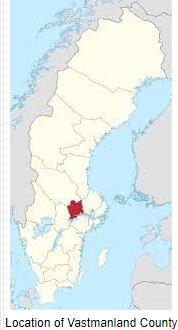 Reuters reported that dead wild boars found in the Municipality of Fagersta in Vastmanland county, Sweden, yielded African swine fever virus. This occurrence is considered significant since the emergence of the disease 130 miles northwest of Stockholm cannot be attributed to migration of wild boars from known endemic regions in central and eastern Europe. It is evident that westward movement of African swine fever in wild boars from central Poland across the common border into eastern states of Germany is an acceptable explanation of the occurrence of ASF in boars in border states of Germany. Observers consider that human action through transport of contaminated pork may have been responsible for the isolated outbreak among scavenging wild hogs.
Reuters reported that dead wild boars found in the Municipality of Fagersta in Vastmanland county, Sweden, yielded African swine fever virus. This occurrence is considered significant since the emergence of the disease 130 miles northwest of Stockholm cannot be attributed to migration of wild boars from known endemic regions in central and eastern Europe. It is evident that westward movement of African swine fever in wild boars from central Poland across the common border into eastern states of Germany is an acceptable explanation of the occurrence of ASF in boars in border states of Germany. Observers consider that human action through transport of contaminated pork may have been responsible for the isolated outbreak among scavenging wild hogs.
The role of humans in transmission of African swine fever by illegal or inadvertent transport of contaminated meat is well documented. U.S. Customs and Border Protection (CBP) intercepted thirteen shipments of prohibited meat between August 20th and 28th at the Louisville, KY. port of entry. After this series of seizures, CBP confiscated 1,000 pounds of pork, 300 pounds of poultry and other prohibited foods that were illegally imported by a company in Bellerose, NY. from a consigner in Hong Kong. The CBP frequently confiscates bologna that travelers attempt to smuggle from Mexico.

During the initial stages of extension of African swine fever from China to neighboring nations in Asia, authorities at airports in Bangkok, Taipei and Singapore confiscated raw pork in the luggage of travelers from China. Some contraband pork yielded viable ASF virus. This situation is paralleled by ongoing seizure in U.S. points of entry with the Beagle Brigade responsible for surveillance of travelers’ luggage and the U.S. Customs and Border Protection monitoring for commercial shipments.
Importation of prohibited raw meat products represents a constant and obvious danger to U.S. livestock and poultry production.